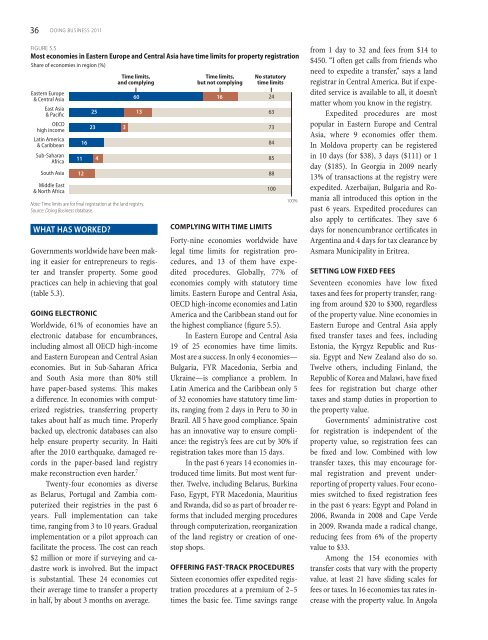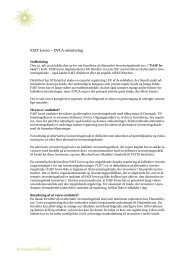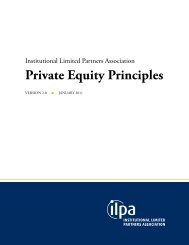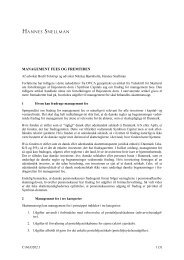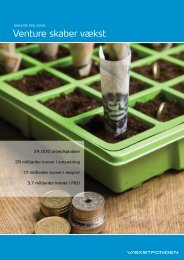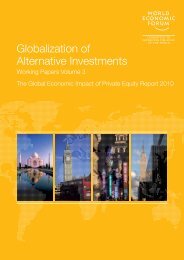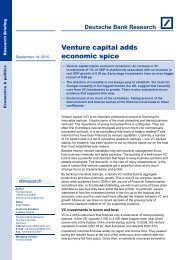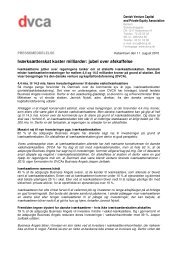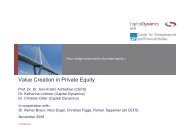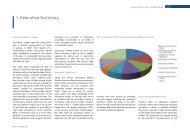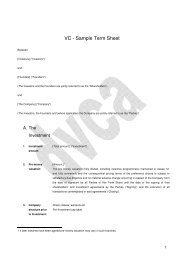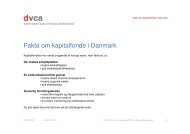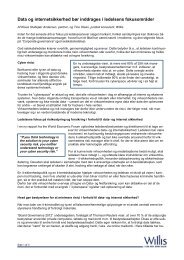A copublication of The World Bank and the - DVCA
A copublication of The World Bank and the - DVCA
A copublication of The World Bank and the - DVCA
Create successful ePaper yourself
Turn your PDF publications into a flip-book with our unique Google optimized e-Paper software.
36 DOING BUSINESS 2011<br />
FIGURE 5.5<br />
Most economies in Eastern Europe <strong>and</strong> Central Asia have time limits for property registration<br />
Share <strong>of</strong> economies in region (%)<br />
Eastern Europe<br />
& Central Asia<br />
East Asia<br />
& Pacific<br />
OECD<br />
high income<br />
Latin America<br />
& Caribbean<br />
Sub-Saharan<br />
Africa<br />
Middle East<br />
& North Africa<br />
Note: Time limits are for final registration at <strong>the</strong> l<strong>and</strong> registry.<br />
Source: Doing Business database.<br />
WHAT HAS WORKED?<br />
Time limits,<br />
<strong>and</strong> complying<br />
Governments worldwide have been making<br />
it easier for entrepreneurs to register<br />
<strong>and</strong> transfer property. Some good<br />
practices can help in achieving that goal<br />
(table 5.3).<br />
GOING ELECTRONIC<br />
<strong>World</strong>wide, 61% <strong>of</strong> economies have an<br />
electronic database for encumbrances,<br />
including almost all OECD high-income<br />
<strong>and</strong> Eastern European <strong>and</strong> Central Asian<br />
economies. But in Sub-Saharan Africa<br />
<strong>and</strong> South Asia more than 80% still<br />
have paper-based systems. This makes<br />
a difference. In economies with computerized<br />
registries, transferring property<br />
takes about half as much time. Properly<br />
backed up, electronic databases can also<br />
help ensure property security. In Haiti<br />
after <strong>the</strong> 2010 earthquake, damaged records<br />
in <strong>the</strong> paper-based l<strong>and</strong> registry<br />
make reconstruction even harder. 7<br />
Twenty-four economies as diverse<br />
as Belarus, Portugal <strong>and</strong> Zambia computerized<br />
<strong>the</strong>ir registries in <strong>the</strong> past 6<br />
years. Full implementation can take<br />
time, ranging from 3 to 10 years. Gradual<br />
implementation or a pilot approach can<br />
facilitate <strong>the</strong> process. <strong>The</strong> cost can reach<br />
$2 million or more if surveying <strong>and</strong> cadastre<br />
work is involved. But <strong>the</strong> impact<br />
is substantial. <strong>The</strong>se 24 economies cut<br />
<strong>the</strong>ir average time to transfer a property<br />
in half, by about 3 months on average.<br />
Time limits,<br />
but not complying<br />
No statutory<br />
time limits<br />
60 16<br />
24<br />
25 13<br />
63<br />
23 3<br />
73<br />
16 84<br />
11 4<br />
85<br />
South Asia 12 88<br />
100<br />
100%<br />
COMPLYING WITH TIME LIMITS<br />
Forty-nine economies worldwide have<br />
legal time limits for registration procedures,<br />
<strong>and</strong> 13 <strong>of</strong> <strong>the</strong>m have expedited<br />
procedures. Globally, 77% <strong>of</strong><br />
economies comply with statutory time<br />
limits. Eastern Europe <strong>and</strong> Central Asia,<br />
OECD high-income economies <strong>and</strong> Latin<br />
America <strong>and</strong> <strong>the</strong> Caribbean st<strong>and</strong> out for<br />
<strong>the</strong> highest compliance (figure 5.5).<br />
In Eastern Europe <strong>and</strong> Central Asia<br />
19 <strong>of</strong> 25 economies have time limits.<br />
Most are a success. In only 4 economies—<br />
Bulgaria, FYR Macedonia, Serbia <strong>and</strong><br />
Ukraine—is compliance a problem. In<br />
Latin America <strong>and</strong> <strong>the</strong> Caribbean only 5<br />
<strong>of</strong> 32 economies have statutory time limits,<br />
ranging from 2 days in Peru to 30 in<br />
Brazil. All 5 have good compliance. Spain<br />
has an innovative way to ensure compliance:<br />
<strong>the</strong> registry’s fees are cut by 30% if<br />
registration takes more than 15 days.<br />
In <strong>the</strong> past 6 years 14 economies introduced<br />
time limits. But most went fur<strong>the</strong>r.<br />
Twelve, including Belarus, Burkina<br />
Faso, Egypt, FYR Macedonia, Mauritius<br />
<strong>and</strong> Rw<strong>and</strong>a, did so as part <strong>of</strong> broader reforms<br />
that included merging procedures<br />
through computerization, reorganization<br />
<strong>of</strong> <strong>the</strong> l<strong>and</strong> registry or creation <strong>of</strong> onestop<br />
shops.<br />
OFFERING FAST-TRACK PROCEDURES<br />
Sixteen economies <strong>of</strong>fer expedited registration<br />
procedures at a premium <strong>of</strong> 2–5<br />
times <strong>the</strong> basic fee. Time savings range<br />
from 1 day to 32 <strong>and</strong> fees from $14 to<br />
$450. “I <strong>of</strong>ten get calls from friends who<br />
need to expedite a transfer,” says a l<strong>and</strong><br />
registrar in Central America. But if expedited<br />
service is available to all, it doesn’t<br />
matter whom you know in <strong>the</strong> registry.<br />
Expedited procedures are most<br />
popular in Eastern Europe <strong>and</strong> Central<br />
Asia, where 9 economies <strong>of</strong>fer <strong>the</strong>m.<br />
In Moldova property can be registered<br />
in 10 days (for $38), 3 days ($111) or 1<br />
day ($185). In Georgia in 2009 nearly<br />
13% <strong>of</strong> transactions at <strong>the</strong> registry were<br />
expedited. Azerbaijan, Bulgaria <strong>and</strong> Romania<br />
all introduced this option in <strong>the</strong><br />
past 6 years. Expedited procedures can<br />
also apply to certificates. <strong>The</strong>y save 6<br />
days for nonencumbrance certificates in<br />
Argentina <strong>and</strong> 4 days for tax clearance by<br />
Asmara Municipality in Eritrea.<br />
SETTING LOW FIXED FEES<br />
Seventeen economies have low fixed<br />
taxes <strong>and</strong> fees for property transfer, ranging<br />
from around $20 to $300, regardless<br />
<strong>of</strong> <strong>the</strong> property value. Nine economies in<br />
Eastern Europe <strong>and</strong> Central Asia apply<br />
fixed transfer taxes <strong>and</strong> fees, including<br />
Estonia, <strong>the</strong> Kyrgyz Republic <strong>and</strong> Russia.<br />
Egypt <strong>and</strong> New Zeal<strong>and</strong> also do so.<br />
Twelve o<strong>the</strong>rs, including Finl<strong>and</strong>, <strong>the</strong><br />
Republic <strong>of</strong> Korea <strong>and</strong> Malawi, have fixed<br />
fees for registration but charge o<strong>the</strong>r<br />
taxes <strong>and</strong> stamp duties in proportion to<br />
<strong>the</strong> property value.<br />
Governments’ administrative cost<br />
for registration is independent <strong>of</strong> <strong>the</strong><br />
property value, so registration fees can<br />
be fixed <strong>and</strong> low. Combined with low<br />
transfer taxes, this may encourage formal<br />
registration <strong>and</strong> prevent underreporting<br />
<strong>of</strong> property values. Four economies<br />
switched to fixed registration fees<br />
in <strong>the</strong> past 6 years: Egypt <strong>and</strong> Pol<strong>and</strong> in<br />
2006, Rw<strong>and</strong>a in 2008 <strong>and</strong> Cape Verde<br />
in 2009. Rw<strong>and</strong>a made a radical change,<br />
reducing fees from 6% <strong>of</strong> <strong>the</strong> property<br />
value to $33.<br />
Among <strong>the</strong> 154 economies with<br />
transfer costs that vary with <strong>the</strong> property<br />
value, at least 21 have sliding scales for<br />
fees or taxes. In 16 economies tax rates increase<br />
with <strong>the</strong> property value. In Angola


